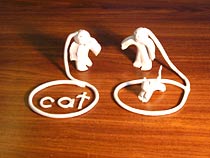Learning Disabilities
Dyslexia was the term originally used to describe reading problems of people who clearly were intelligent enough to be able to learn to read. Now there are over seventy different names used to describe various aspects of learning disabilities and attention deficit disorder. The term “learning disabilities” is most frequently used in Canada, while in other countries learning disabilities are collectively called “dyslexia”.
Most people who have dyslexia are smart, yet have difficulty with basic academic skills such as reading, spelling, writing, arithmetic, or paying attention. They are visual thinkers, are often intuitive and highly creative, and they excel at hands-on learning. But because they think in pictures, it is hard for them to deal with letters, numbers, symbols, and abstract words for which they have no mental images.
Dyslexic people can learn to read, write, and study effectively when using methods geared to their unique learning style.

Non-dyslexic (auditory-sequential) thinker (left) Vs Dyslexic, (visual-spatial thinker) (right)
Dyslexia Common Characteristics
- is very bright, but doesn’t do well in school
- feels “dumb”, has low self-esteem
- is easily frustrated and emotional about school, reading, or taking tests
- reads or writes with additions, omissions, substitutions, and repetitions, often seeming to pay little attention to the sequence of letters in words
- tires quickly and makes many mistakes when writing or copying
- “zones out” or daydreams often, seeming not to hear what is said; is easily distracted
- gets lost easily or loses track of time
- may be hyperactive or hypoactive
- has difficulty organizing self, tasks, or belongings
- leaves many tasks unfinished
- has difficulty telling time or managing time, or learning sequenced information (e.g. days of the weeks, months of the year)
- can do arithmetic, but not word problems
- misreads function signs in math (+, -, x, =)
INTERESTED?
Learn how our Programs work! Dyslexia, Autism, Attention Mastery, Math, Stress.
GET IN TOUCH NOW!
Explore how Beth Shier and her staff can help you or your child. We would love to hear from you!
